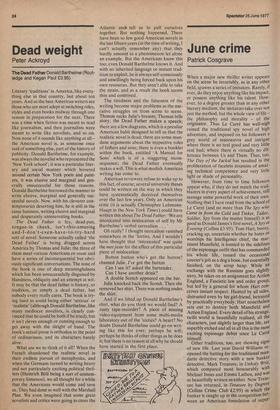Dead weight
Peter Ackroyd
The Dead Father Donald Barthel me (Routledge and Kegan Paul £3.95) Literary 'traditions' in America, like everything else in that country, last about ten years. And so the best American writers are those who are most adept at switching roles, styles and even books midway through one season in preparation for the next. There was a time when fiction was meant to read like journalism, and then journalists were meant to write like novelists, and so on. Now none of it sounds like anything at all — the American novel is, as someone once said of something else, part of the history of publicity. Donald Barthelme, for example, was always the novelist who represented the 'New York school'; it was a particular literary and social manner which hovered around certain New York poets and painters, it was elusive and marginal and generally unsuccessful for those reasons. Donald Barthelme borrowed the manner to write elusive, marginal and generally successful novels. Now, with his cleverer contemporaries deserting him, he is still in the same business, writing elusive and marginal and desperately uninteresting books.
The Dead Father is fey, dead-pan, tongue-in cheek, isn't-this-amusing and I don't-evn-have-to-try-hard sort of novel. Someone actually called 'the Dead Father' is being dragged across America by Thomas and Julie; the three of them meet various Americans en route and have a series of inconsequential but obviously significant conversations. The tone of the book is one of deep meaningfulness which has been unsuccessfully disguised by blandness, obliquity and an attempt at wit. It may be that the dead father is history, or tradition, or simply a dead father, but nobody every, really cares. The book is trying hard to avoid being either 'serious' or 'realistic' (although Donald Barthelme, like many mediocre novelists, is clearly convinced that he could be both if he tried), but it isn't clever enough or cunning enough to get away with the sleight of hand. The book's actual prose is orthodox to the point of ordinariness, and its characters barely alive.
What are we to think of it all? When the French abandoned the realistic novel in their endless pursuit of metaphysics, and when the Germans turned to writing heavy and not particularly exciting political thrillers (Heinrich Boll being a sort of contemporary Simenon), we all thought for a while that the Americans would come and save us. They had done so well with the Marshall Plan. We even imagined that some great novelists and critics were going to cross the Atlantic and' tell us to pull ourselves together. But nothing happened. Tbere have been so few good American novels in the last fifteen years (at the time of writing, I can't actually remember any) that they hardly amount to a phenomenon let alone an example. But the Americans know this too; even Donald Barthelme knows it. And with no inherited language or instant tradition to exploit, he is always self-consciously and unwillingly being forced back upon his own resources. But they aren't able to take the strain, and as a result the book seems thin and contrived.
The tiredness and the falseness of the writing become major problems as the narrative struggles on from scene to scene. Thomas sucks Julie's breasts; Thomas tells story; the Dead Father makes a speech; there are a few diagrams, which is a peculiar American habit designed to tell us that the realistic novel is dead; there are some mundane arguments about the respective roles of fathers and sons; there is even a booklet within the book, entitled 'A Manual for Sons' which is of a staggering inconsequence; the Dead Father eventually makes a will. This is what modish American writing has come to.
American reviewers refuse to wake up to this fact, of course; several university theses could be written on the way in which they have systematically deceived themselves over the last few years. Only an American -critic (it is actually Christopher LehmannHaupt in the New York Times) could have written this about The Dead Father: 'We are intoxicated into mislocation of self by Mr
Barthelme's verbal surrealism . '
Oh really? I thought surrealism vanished somewhere in the 'forties. And I wouldn't have thought that 'intoxicated' was quite the mot juste for the effect of this particular piece of mislocation: Button button who's got the button? chanted Julie. I've got the button
Can I see it? asked the bartender.
Can I have another drink?
A double Scotch appeared on the bar.
Julie knocked back the Scotsh. Then she removed her shirt. There was nothing under. the shirt.
And if we lifted up Donald Barthelme's shirt, what do you think we would find? A rusty tape-recorder? A piece of missing video-equipment from some multi-media laboratory out of the 'sixties? A heart? No doubt Donald Barthelme could go on writing like this for ever; perhaps he will; perhaps he thinks of other things as he does it; but there is no reason at all why he should have started in the first place.














































 Previous page
Previous page